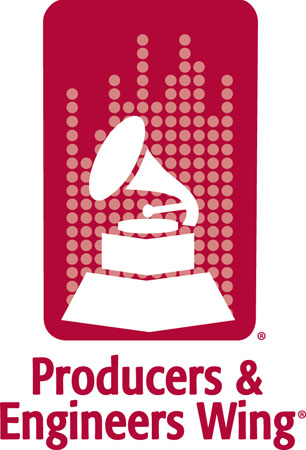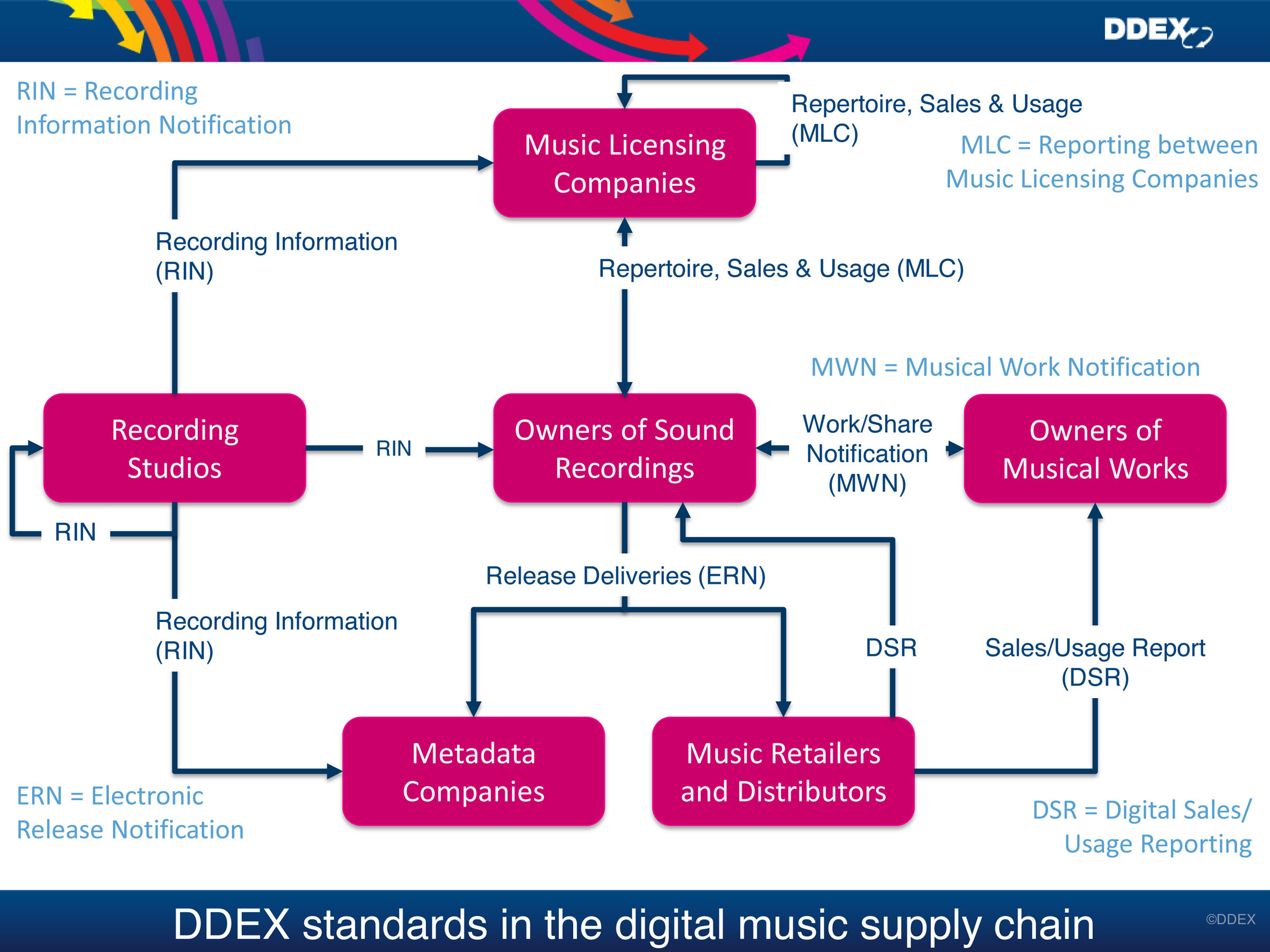Digital Data Exchange (DDEX) celebrates its 10th anniversary and announces the launch of its latest standards, the Recording Information Notification (RIN) and a new Digital Sales Report (DSR)


Berlin (Germany), 13thOctober 2016 - Digital Data Exchange, LLC (DDEX), celebrated today in Berlin its 10th anniversary with the launch of its latest standards and a decade of successful achievements in data exchange standards for the digital music industry.
DDEX is a broad-based not-for-profit organisation made up of a leading media companies, music licensing organisations and digital service providers, working together in a unique collaboration, to create voluntary standards that support efficient digital distribution of digital content. Founded in 2006, DDEX has successfully developed a range of international standards for the communication of metadata along the music supply chain.
Today over 2,500 companies are using DDEX’s standards, from music right societies, music publishers, record companies, musical work licensing companies, to technology intermediaries and online music services. With the launch of its two latest standards – Recording Information Notification (RIN) and the new Digital Sales Report (DSR) format – DDEX now covers the entire digital music ecosystem (see graphic), rationalising and automating the exchange of information needed to license, track, and account for music sales and usage.
DDEX standards support the digital music ecosystem
The digital music supply chain relies on the management of a high-volume of low-value transactions. The sale or use of a digital music track often requires record companies, retailers, music rights societies and other intermediaries to interact multiple times, from ‘announcing’ the track is available to reporting its usage. With the ever increasing volume and complexity of digital music and media transactions, the only way for the digital music supply chain to be efficient and cost effective is to have all parties adopt common digital standards and identifiers across the ecosystem.
“Widely adopted technical standards are vital to ensuring rights holders get proper credit for their work and get properly paid. DDEX already has standards which are used globally but it has invested in new standards in recent years to keep up with the shifts in industry business models and promote the widest possible use”, explained Nick Williamson, Music Publishing Operations at Apple and Chairman of DDEX.
“An automated global transaction processing infrastructure based on open standards provides operational savings whilst enabling faster adoption of new and improved digital music options for consumers which ultimately drives revenue for content creators”, added Mark Isherwood, member of the DDEX Secretariat.
A 2013 study entitled ‘The Total Economic Impact of The DDEX Standards’ (conducted by Forrester Consulting on behalf of Microgen) revealed a 66% reduction in key operations expenses over 5 years for the various players in the ecosystem that adopt the DDEX data exchange standards. The new standards introduced today will continue to increase operational efficiency.
Recording Information Notification (RIN) captures metadata at the point of creation of a musical work / sound recording
DDEX announced the completion of the Recording Information Notification (RIN), an XML file that standardises the metadata describing all aspects of a recording project. RIN is designed for Digital Audio Workstation (DAW) manufacturers to enable their users to capture and store essential metadata in a standard form at the point of creation of a musical work and/or sound recording.
DDEX standards and digital music companies rely on “good” metadata being put into the supply chain. One of the best sources for good metadata about music is the place where the music is made: the recording studio. Once studio personnel use the RIN specifications to capture good metadata, this will enable retailers to have better metadata about the products they are selling and it will smooth the process by which all rights holders and other contributors are properly remunerated. The metadata related to these audio files will be interoperable with all the other DDEX standards used to communicate data along the supply chain thus enabling a much more efficient information flow from the studio into the supply chain.
“RIN will facilitate crediting, ensuring that performers, producers, recording engineers are properly identified and paid for their contributions”, stated Maureen Droney, Managing Director at The Recording Academy Producers & Engineers Wings and a key member of the RIN Working Group. “Organisations that collect and distribute performance royalties to creative contributors often find it difficult to obtain information on their identity. With this revenue stream growing it is more important than ever to streamline the process of identifying and paying the appropriate parties”
“RIN will also enrich the consumer experience providing important technical and creative information on the sound recording”, added John Sarappo, Director of Engineering at VeVa Sound and also a key member of the RIN Working Group. “As an example, notes taken during the recording or mixing sessions can enhance a fan’s enjoyment of the music”.
Digital music service providers, music publishers and music rights societies agree on a new digital sales reporting (DSR) format
DDEX announced today that is has established a new sales and usage format designed to accommodate the complex business models now being used by digital service providers and to significantly ease the management of the huge volumes and complexities of data being exchanged.
The Digital Sales Report (DSR) Flat File Standard enables digital service providers to report sales and usage information to rights owners. Such reporting is vital in enabling music publishers and music right societies to make payments to their composers and songwriters. The flat file format is structured to enable complex uses of musical works to be reported in a form that allows music publishers and rights societies to allocate the correct value of royalty to each sale or use for distribution onto the rightful people and organisations.
“DDEX members have been working together for the past 2 years to ensure this new standard meets the requirements of everyone in the value chain”, explained Laurent Lemasson of the Information System Department at SACEM and the Chairman of the DSR Working Group. “For an author’s rights collective society such as SACEM the data we receive in relation to sales and usage of our members’ musical works is absolutely critical in enabling us to collect and distribute royalties efficiently, accurately and fairly”.
“We are extremely pleased at the highly consensual way DDEX members in different parts of the supply chain have worked to reach this successful launch”, FX Nuttall, Product Specialist at YouTube/Google and a key member of the DSR Working Group. “DSRF is an innovative blend delivering complex data structures and simple file formats, suitable for large and smaller actors alike, to deal with the inherent complexities of the music industry”.
Several DDEX member companies have already or are in the process of implementing DSR with their business partners. DDEX expects to further develop this standard for reporting sales and usages to record companies and music licensing companies.
About DDEX
Digital Data Exchange or DDEX (pronounced “dee-dex”), was formed in May 2006 to explore, develop and maintain a robust framework of open and voluntary data exchange standards for information relating to digital media content, with an initial focus on music-related content. The charter members of the not-for-profit organisation are the record companies Sony Music Entertainment, Universal Music Group and Warner Music Group; music licensing companies SCPP and SoundExchange; music rights societies ASCAP, BMI, GEMA, PRS for Music, SACEM and SOCAN; music publisher Kobalt Music Group; and the digital service providers Amazon, Apple Inc., Google and Pandora.
Get the TV Tech Newsletter
The professional video industry's #1 source for news, trends and product and tech information. Sign up below.
